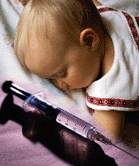
FRIDAY, June 15 (HealthDay News) — A new combination vaccine that protects children against two potentially deadly bacterial diseases has been approved by the U.S. Food and Drug Administration.
The Menhibrix vaccine is for children ages 6 weeks to 18 months and guards against the bacteria Neisseria meningitidis (meningococcal disease, including bacterial meningitis) and Haemophilus influenzae type b (Hib disease).
These bacteria can cause sepsis by infecting the bloodstream and can cause meningitis by infecting the lining that surrounds the brain and spinal cord. Diseases caused by these bacteria often progress rapidly and can cause death or serious, long-term problems such as blindness, mental retardation or amputations, according to background information provided in an FDA news release.
Early symptoms for both meningococcal and Hib diseases can be difficult to distinguish from other common childhood illnesses, the experts noted.
The FDA approval is based on studies that assessed the effectiveness of the vaccine in several hundred U.S. infants and toddlers and tested the safety of the vaccine in about 7,500 infants and toddlers in the United States, Mexico and Australia.
Common negative side effects included pain, redness and swelling at the injection site, as well as irritability and fever.
Menhibrix is given as a four-dose series at 2, 4, 6 and 12 through 15 months of age. The first dose may be given as early as 6 weeks of age and the fourth dose may be given as late as 18 months of age.
“With today’s approval of Menhibrix, there is now a combination vaccine that can be used to prevent potentially life-threatening Hib disease and two types of meningococcal disease in children. It is the first meningococcal vaccine that can be given starting as young as 6 weeks of age,” Dr. Karen Midthun, director of the FDA’s Center for Biologics Evaluation and Research, said in the news release.
The vaccine is made by GlaxoSmithKline Biologicals.
More information
The U.S. Centers for Disease Control and Prevention has more about meningococcal disease.

